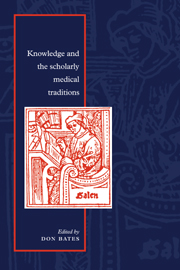Book contents
- Frontmatter
- Contents
- List of illustrations
- List of contributors
- Acknowledgements
- 1 Scholarly ways of knowing: an introduction
- Part 1 Scholarly medicine in the West
- 2 Epistemological arguments in early Greek medicine in comparativist perspective
- 3 Autopsia, historia and what women know: the authority of women in Hippocratic gynaecology
- 4 The growth of medical empiricism
- 5 Scholarship and social context: a medical case from the eleventh-century Near East
- 6 The experience of the book: manuscripts, texts, and the role of epistemology in early medieval medicine
- 7 Artifex factivus sanitatis: health and medical care in medieval Latin Galenism
- 8 Epistemology and learned medicine in early modern England
- Part 2 Chinese traditional medicine
- Part 3 Āyurvedic medicine
- Part 4 Commentaries
- Index
6 - The experience of the book: manuscripts, texts, and the role of epistemology in early medieval medicine
Published online by Cambridge University Press: 01 February 2010
- Frontmatter
- Contents
- List of illustrations
- List of contributors
- Acknowledgements
- 1 Scholarly ways of knowing: an introduction
- Part 1 Scholarly medicine in the West
- 2 Epistemological arguments in early Greek medicine in comparativist perspective
- 3 Autopsia, historia and what women know: the authority of women in Hippocratic gynaecology
- 4 The growth of medical empiricism
- 5 Scholarship and social context: a medical case from the eleventh-century Near East
- 6 The experience of the book: manuscripts, texts, and the role of epistemology in early medieval medicine
- 7 Artifex factivus sanitatis: health and medical care in medieval Latin Galenism
- 8 Epistemology and learned medicine in early modern England
- Part 2 Chinese traditional medicine
- Part 3 Āyurvedic medicine
- Part 4 Commentaries
- Index
Summary
The historiographical problem of early medieval medicine
Since the time of Karl Sudhoff and his students, medical historians have been labouring with patience and energy to edit the texts available in the pre-Salernitan period (sixth to eleventh centuries), and to present the manuscripts through which these texts were conveyed. Yet no satisfactory history of early medieval medicine has appeared, nor has any been attempted since MacKinney's slender 1937 survey. This lacuna is all the more curious in that, more than half a century ago, Henry Sigerist set out a cogent plan for how a critical and synthetic history of early medieval medicine, based in the manuscript sources, might be written. Sigerist proposed a survey in three volumes. The first would be a catalogue of manuscripts containing early medieval medical materials, the second an anthology of texts, the third the narrative history.
Sigerist's plan seemed clear and practical, yet it never materialized. To be sure, the intention of the first volume was fulfilled in 1956 with the publication of Augusto Beccaria's repertory of early medieval medical manuscripts, supplemented in 1966 by that of Ernest Wick-ersheimer. As well, the editing of texts and the provision of studies of individual manuscripts continues apace. Yet despite the wealth of primary materials now accessible, there is no sign of any plans to attempt the third stage, the general history. Was there something wrong with Sigerist's logic? Why is a plethora of sources not leading us inexorably towards a narrative account?
I would suggest that the problem lies in the process of text edition itself, or more precisely, in the often unexamined assumptions about texts that editing reinforces.
- Type
- Chapter
- Information
- Knowledge and the Scholarly Medical Traditions , pp. 101 - 126Publisher: Cambridge University PressPrint publication year: 1995
- 8
- Cited by

